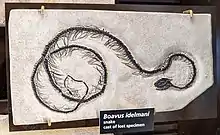Boavus
Boavus is an extinct genus of boa known primarily from Eocene-aged strata of North America. At least three species (B. occidentalis, B. idelmani, and possibly B. agilis) are known from the Middle Eocene Green River lagerstätte in Wyoming, two species from Eocene strata of Uinta County (B. occidentalis again, B. brevis), and at least one species is known from the middle to late Eocene-aged Sespe Formation of California (B. affinis).[1] Boavus was a small snake measuring between 1 and 2 metres (3.3 and 6.6 ft) long.[2]
| Boavus | |
|---|---|
 | |
| B. idelmani | |
| Scientific classification | |
| Domain: | Eukaryota |
| Kingdom: | Animalia |
| Phylum: | Chordata |
| Class: | Reptilia |
| Order: | Squamata |
| Suborder: | Serpentes |
| Family: | Boidae |
| Genus: | †Boavus Marsh, 1871 |
| Type species | |
| Boavus occidentalis Marsh, 1871 | |
| Species | |
| |
Post-Eocene specimens
Three vertebrae very similar in form, if not identical to those of B. occidentalis were found in early Oligocene-aged strata of South Dakota.[1] Remains of what may be B. affinis are found in Late Miocene (Early Barstovian-aged) strata of Trinity River in Texas.[1]
References
- Holman, J. Alan (2000). Fossil Snakes of North America: Origin, Evolution, Distribution, Paleoecology. Indiana University Press. pp. 357 (pp40-49). ISBN 9780253337214.
- Silvio Onary; Annie S. Hsiou; Michael S. Y. Lee; Alessandro Palci (2022). "Redescription, taxonomy and phylogenetic relationships of Boavus Marsh, 1871 (Serpentes:Booidea) from the early–middle Eocene of the USA". Journal of Systematic Palaeontology. 19 (23): 1601–1622. doi:10.1080/14772019.2022.2068386. S2CID 249484060.